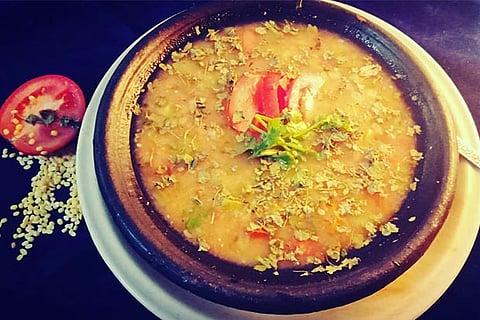

Chennai
Along with Mandu, the taxi driver, we trekked towards the outskirts of Munsiyari, a village in Uttarakhand. This is where my adventure loving nephew Ram Narayanan, alias Arun, had built a house with glass on four sides so one could view the mountains at all times, except when the fog descended or snowed. One look at the home and we felt that we had reached heaven.
Munsiyari is a little gem nestled in the mountains of Kumaon in Uttarakhand. One cannot usually discover its little secrets if one visits as a typical tourist. Visit the place as a nature enthusiast, a seeker of beauty, and a person of curiosity for the Nepalese and Tibetan food, and you will find it unveils its beauty and myriad tales and secrets.
Some of the scenes our eyes feasted on in this little village included, houses dotted on its hillside, shepherds and their flocks and children with runny noses running behind a tribal lady selling locally made sweets.
The captivating view of the Panchachuli range, the uniquely salubrious climate — all add to the inner discovery that the trip is suddenly worth all the efforts made. It is believed that the Panch Pandavas, on their way to heaven, cooked on each one of these peaks. It is said that the name Panchachuli came from ‘chulla’ (a mud stove for cooking) and ‘panch’ meaning five.
As I recall the journey, it involved us walking up the mud path, with the mountains on all sides radiating so much beauty and strength that simply looking around refreshed one.
Arun, my nephew was waiting for us at his wood and glass house, which was amidst lime and fruit orchards. Throughout the journey, my friend Janet and her daughter Mathilda kept voicing a strong desire for some local soup as thirst and hunger has overtaken our senses.
We had travelled up to Almora and had taken a cab from there. Along the way, the cab driver Mandu kept talking about food, which made us hungrier. Except for some local chai and roti for breakfast, we had nothing else on our journey between Almora and Munsiyari, which was about 220 km — filled with pure oxygen and some untouched places amidst the Himalayan ranges. After 10 wonderful, but gruelling hours in the nature, we reached my nephew’s house at around 6 pm.
The first sight of his two-storey cottage enthralled us. Though we were tired, we were refreshed by the thought of the local meal he had cooked for us. The dinner was a simple affair with a few items on the table, but each of the preparations was food for the soul.
There was malka dal (masoor) soup — served with a tadka of jeera, vegetables, spices and a local dried herb called jimbu. Jimbu is only grown in the hilly tracts of Uttarakhand and Nepal, and this house had a small garden where it was cultivated. It has a distinctive flavour, akin to garlic.
The vegetables served were rai ki sabji, a preparation of mustard leaves with salt and green chillies. There was also a potato dish with beans, and not to forget, the bhang ki chutney and rice. We were told that this version of the chutney uses mint apart from the bhang. The food was outstanding, especially the soup, which was loved by my friends. After dinner, we were off to lala land and deep slumber in cosy sleeping bags.
The local cuisine is a unique combination of Nepalese and Tibetan food cultures, which lie on either side. Many of the herbs used by the first tribal people to settle here can even be viewed at the local museum.
It is not only the majestic views of the mountains that are dazzling, but also the way the communities have come together to conserve the environment and ensure a sustainable livelihood for people which make this place awe-inspiring.
Life is slow moving in this quaint hill station and one is caught in a beautiful web of stunning views and inspirational people cooking long-forgotten tribal recipes of their ancestors with whatever ingredients available.
Munsiyari Special Lentil Soup
Preparation Time: 10 min
Cooking Time: 20 min
Serves: 4
Calories per serving: 280
Ingredients
Mustard oil/ sesame oil: 1 tbsp
Onion: 1 finely chopped
Garlic: 3 cloves finely chopped
Ginger: 1 tbsp finely grated
Jimbu herb: a few strands
Garam masala powder: 1 tbsp
Turmeric powder: 1 tsp
Chilli powder: 1/2 tsp (optional)
Medium sized potatoes: 3 diced
Carrots: 2 sliced
Masoor dal, moong dal: 200 gm rinsed
Vegetable stock: 4 cups
Himalayan salt: to taste
Tomatoes: 3 diced
Method
Kitchen Tips
— Chef Ramaa Shanker is the author of ‘Festive Offerings to the Gods: Divine Soul Recipes’
Visit news.dtnext.in to explore our interactive epaper!
Download the DT Next app for more exciting features!
Click here for iOS
Click here for Android